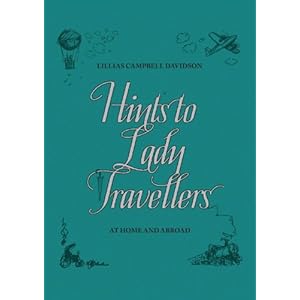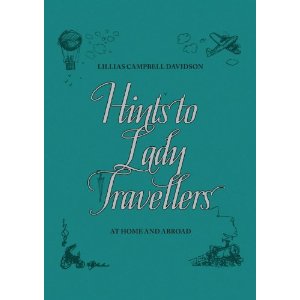
One of my dearest friends just gave me a delightful gift. It is a little book re-printed from 1889 entitled Hints to Lady Travellers At Home and Abroad. Although the book is quite obviously dated, it still actually contains very practical traveling advice, and is quite hilarious, allowing us a glimpse into the travelling ways of lady travelers during the Victorian period. So once in a while I’m going to delight you all with an excerpt from Ms. Lillias Campbell Davidson’s insightful little book.
Here is the author’s advice to ladies on traveling with money:
There is always a good deal of anxiety connected with money travelling. Ladies, as a rule, are not so conveniently supplied with the means of carrying this necessary but troublesome commodity as are the members of the other sex; and a purse is a thing which is easily lost, mislaid, or stolen.
It is unwise to carry large sums of money about with one, and it is safer only to put in one’s purse such an amount as will be required during the day’s journey, with a margin over for unforeseen occurrences, possible loss of ticket, etc.
Surplus gold and notes should be sewn into the bodies of one’s dress, or in some such secure place of refuge. Many ladies put their sin the drawer of their dressing-case, or some such ordinary receptacle; but as a dressing-case is always supposed to contain valuables it is much more likely to be carried off bodily, spare cash and all, than any other part of one’s belongings. Neither is it safe to put much money in one’s boxes, where it is exposed to perils of various sorts.
It would be wiser to leave most of one’s money at home, and trust to one’s cheque-book while on one’s travel’s, were one always sure of being within easy reach of a bank. Indeed, even then, it is most difficult to get a cheque for any considerable amount of money cashed at a bank where one is not known.
Five and ten pound notes are better in such a case, and can always be paid into a bank, but they are more likely to be stolen; and are very difficult to pass in the country districts, where the tradespeople may object to take them unless they know you. Numbers of bank-notes should always be taken, that the payment may be stopped in case they are lost or stolen.
Perhaps as good a plan as any is to convert five or ten pounds into postal orders, made out to oneself. If they are then signed with one’s name, they are pretty safe, and the name of the post-office can always be filled in as occasion requires. These postal orders have the portability of bank-notes, and are safer; besides being readily change din districts where there are no banks to visit.
In Scotland the one pound notes are a convenience, and in universal circulation. Care must, however, be taken to dispose of any in one’s possession before one crosses the Border, as they are not legal tender in this part of the kingdom, and it will be found a nuisance to get them changed.
A very excellent system is that of the Post Office Savings Bank. With a deposit placed there before one leaves home, and with one’s bankbook in one’s possession, one can withdraw any sum of money in any part of the kingdom at a couple of days’ notice. More than thirty pounds cannot, however, be deposited during the year, and the whole sum to a depositor’s credit is not allowed to exceed 150 [pounds]. Is is therefore only useful in case of requiring small sums.
Related Pages
What Documents Does Baby Need for Travel?
Keep Your Family’s Travel Documents Organized
20 Steps to Prepare for International Travel with Baby
Related articles
- UK travellers relying on overseas ATMs may pay more for their travel money (uk.prweb.com)
- Get ready for more plastic in your wallet; new polymer $20s unveiled today (thestar.com)
- Traveller’s cheques (leggotunglei808.wordpress.com)
